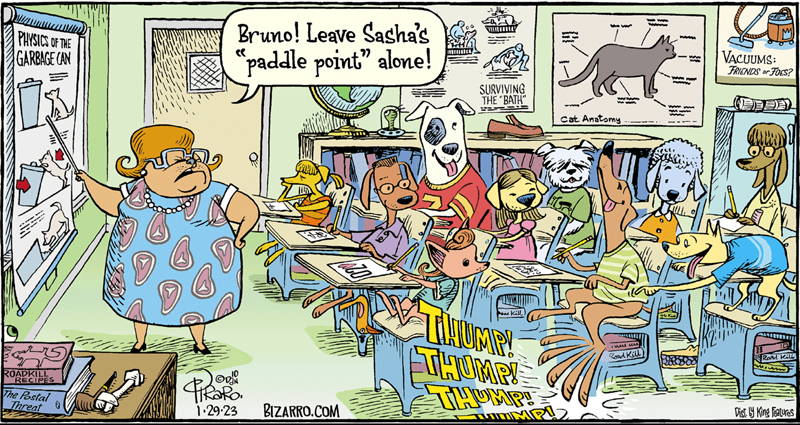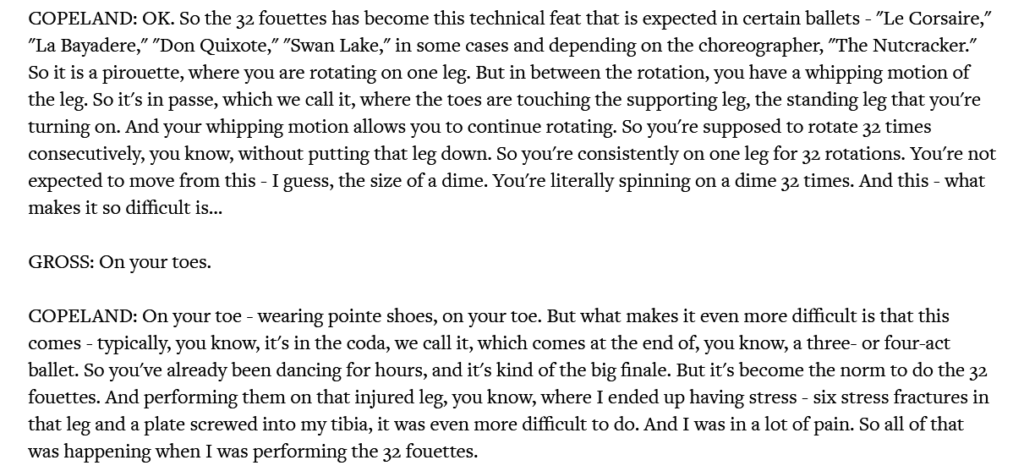
In these fraught times, silly humor is doubly welcome, and educational as well: Bizarro (KFS) also offers a new-to-me term for what I’ve always known as the “puppy nerve.”
Nothing more to add except that, between the collection of different dogs and their differing reactions, and the textbooks and posters, this is quite an example of how much fun you can have within a single panel.
Fun is good. We like fun.
Sticking with classroom humor, Jason Chatfield takes a swipe at AI writing, but I’m not sure if what I’m hearing from teachers is actual reports, or simply anticipation, of having the stuff turn up in homework.
I do know that CNET has been using AI to write articles, and it made me think of the first application I am aware of, some thirty years or so ago, when somebody developed a computer program to crank out local sports stories: You simply fed it the final score and the high scorers and it would produce a brief that was no more creative than what someone who hadn’t been at the game would have written.
The technology has improved, but with greater sophistication comes more regrettable flaws: CNET had to issue corrections on 41 of 77 AI-generated stories. You might think it might be more efficient to write the stories yourself than to spend time tracking down the errors, but, then, a lot of papers are laying off their copy editors and hoping for the best, which means they aren’t catching errors by human reporters either.
In a decade of editing middle-school journalism for a weekly publication, I only caught two cases of plagiarism, one from a new kid who genuinely didn’t get it and one from an over-committed kid under a mountain of deadlines.
If you’re paying attention, it’s not hard to spot unlikely prose and there are programs that you can run it through to verify the fakery.
OTOH, a college-level teacher I knew ran into a case of a freshman turning in a paper that was simply too well written.
I knew the kid because he’d done time for a burglary I covered in my reporting days, but that’s only anecdote, not evidence. So I suggested she assign an in-class writing exercise to see how he did, and, again, his work was excellent. It’s not a bad idea to leave open the possibility of talent.
He dropped out of school before the end of the first semester, because he was still a screw-up, but our juvenile facilities are full of brilliant screw-ups. Different problem for a different day.

In Sherman’s Lagoon (AMS), little Herman has been trying out for the school chess team, and yesterday’s episode coincided with a conversation I had about youth sports and parents not turning up for games.
The idea of an auditorium full of parents is more fanciful than the notion of sharks and squid playing chess.
I coached rec league soccer for years, and, while we had the screaming parents on the sidelines, we had far more parents who never showed up at all. I thought, at the time, that they figured they’d bought a pair of cleats and a set of shin guards and it was cheaper than hiring a sitter.
I preferred the over-involved parents. I could kinda hose down the screamers, but I had no clue what to do about the ones who didn’t give a damn at all.
Which translated some years later to when I was running a high school Quiz Bowl and parents weren’t showing up for that, either.
I think of these kids as Mowgli Children — abandoned in the jungle and dependent on the good nature of wolves.
Juxtaposition of the Day


The Work-From-Home movement sprang up during the pandemic in part to protect workers from undue contact with each other and in part because, with schools going remote, somebody had to be around for the kids.
My first experience working from home involved having kids at home while I was freelancing, and then I worked from home for the last decade before retirement, when I was empty-nested and single. In between, I worked in offices, and, taking it all in all, it was simply a different set of distractions.
I personally found the distractions in the office more disruptive, while the ones at home were more attractive. Ben’s daughter loves the kids she’s supposed to be working around, while the fellow in Alex is clearly torn between the servants he no longer has at work and being the servant he feels he is at home.
You can likely guess where my sympathies lie.

Meanwhile, over in On the Fastrack (KFS), Dethany and Fi need to be careful about how they handle the concept of “work for hire,” because, if you put an idea into practice in your job, it doesn’t likely matter where you were physically when it occurred to you.
Probably. Mostly. Maybe.
A Google search for “Work for Hire” will lead you into a tangle of legal cases most of which seem to suggest that, unless you’ve absolutely, positively laid out on paper who owns the rights to what, the answer will mostly come down to who has attorneys on retainer versus who has to pay them by the hour.
Don’t think. Don’t innovate. It only leads to trouble.

Grand Avenue (AMS) brings up two matters.
One was that I much preferred coaching in the fall, when the youth soccer league ran itself, because the kids who showed up then really wanted to be there. In the spring, it was part of the Parks & Rec program, and too many parents offered their kids a choice of what to sign up for, but were adamant that they do something. Even if they didn’t want to.
The other thing is that Gabby isn’t wrong about the physical hazards of dancing, particularly ballet, which ought to tie into parental anxieties about sports injuries.
As Misty Copeland explained to Terry Gross on Fresh Air:

Add the potential for eating disorders and other hazards of the profession and you might better sign your daughter up for rugby.
Better yet, don’t sign her up for anything unless she indicates an interest.
Then sign yourself up to be there, whether it’s soccer or chess club or quiz bowl or ballet or rugby.
(Personal Trivia: I had a summer romance with a pretty ballerina when this song was on the charts.
Somewhere a mountain was moving; afraid it moved without me.)


For some strange reason, my YT feed has been showing me choices of videos about what happens to your feet when you wear those point shoes. Yuck. No different than Chinese foot-binding (and yes, videos about THAT have come up, too. I cannot imagine why).
What a difference a genreation makes in youth sports. When I played, parental attendance at our games was appreciated but not expected. Since our games were on local fields on summer evenings, or in the school gym on Satruday mornings, most parents would occassionaly stop by and watch us play if they had no other plans. (The concept of travel teams and the resulting time and money commitment was fortunately in the future.) I can’t say we were disappointed when they didn’t show up as we just happy playing ball.
For some reason “dance lessons” immediately brought to mind ballroom dancing. I guess I ‘m 2-3 generations behind the times
I worked at Xerox for 30 years; my name is on a dozen of their patents but I don’t believe any of them made any money for them and I certainly could not have profited from any of them on my own. (The dinner awards and annual banquet were nice, though.)
There was, however, a process for obtaining IP ownership: submit an invention proposal, and if the review committee found that the idea was of no interest to Xerox one could get it cleared (after which patenting was the inventor’s problem and expense), I served on several dozen review committees and only encountered this once.
Speaking of AI and comics – this came into my feed today . . . Barney & Clyde . . .
https://assets.amuniversal.com/bf60d00083c2013be172005056a9545d.gif
“…somebody developed a computer program to crank out local sports stories: You simply fed it the final score and the high scorers and it would produce a brief that was no more creative than what someone who hadn’t been at the game would have written.”
shades of the Gipper…
https://www.reaganlibrary.gov/virtual-exhibits/reagan-and-baseball
“If you’re paying attention, it’s not hard to spot unlikely prose…”
in my Design History courses at a certain University, i’d always chuckle whenever i read student assignments that contained lengthy grafs pilfered verbatim from essays by friends of mine. no Turnitin necessary.
at least they always credited me when they quoted from my articles. ?
.